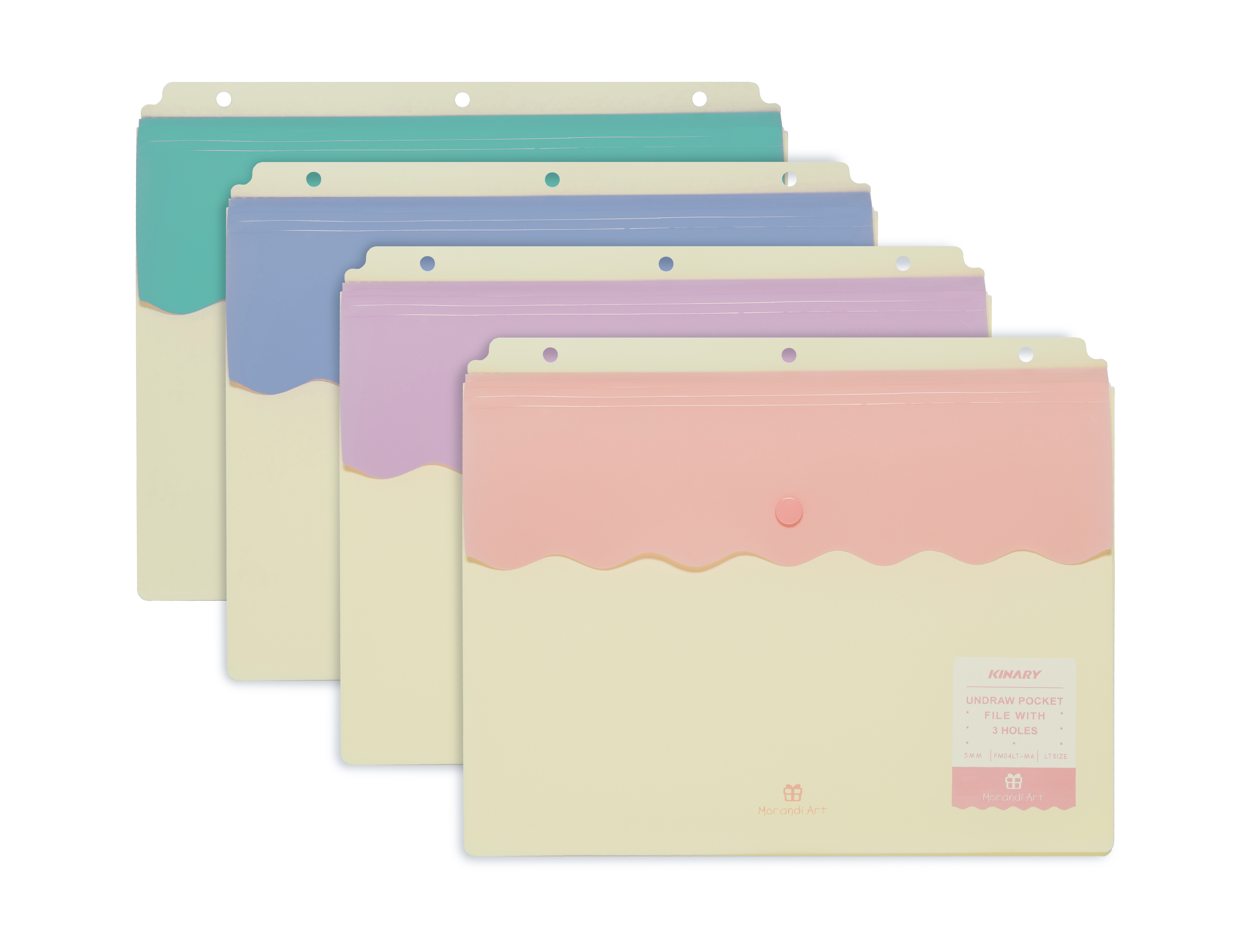Where Can Expanding Files Be Used Beyond the Office?
Introduction to Expanding Files
Organization is the foundation of productivity, whether in professional or personal life. One tool that has long been associated with office environments is the expanding file. Typically designed with multiple pockets and an accordion-style structure, expanding files allow users to categorize, separate, and safely store documents in one compact solution. While their value in offices is well established, expanding files have proven to be much more versatile than many realize. From classrooms and homes to travel and creative projects, expanding files serve as practical tools for organizing more than just paperwork. By understanding their potential uses beyond the office, individuals can make the most of this simple yet effective storage accessory.
What Makes Expanding Files Useful?
Design and Structure
Expanding files are characterized by their accordion-style design that expands outward as compartments are filled. Each section provides space for organizing different categories of papers, tickets, or even small items. This structure allows flexibility while maintaining compact storage.
Materials and Durability
Most expanding files are made from durable polypropylene, fabric, or reinforced paperboard. These materials resist tearing, bending, and water damage, making expanding files ideal for frequent use in a variety of settings.
Portability
Lightweight and easy to carry, expanding files often feature handles, closures, or snap buttons to keep contents secure. Their portable design makes them useful beyond traditional office desks.
Educational Uses of Expanding Files
For Students
Students at all levels often juggle multiple subjects, assignments, and projects. Expanding files offer an effective way to keep notes, handouts, and assignments neatly organized by subject or due date. This eliminates the chaos of loose papers in backpacks and allows quick retrieval when needed.
For Teachers
Teachers can also benefit from expanding files by categorizing lesson plans, graded assignments, attendance sheets, and administrative paperwork. By using expanding files, they can carry classroom essentials between school and home without losing important documents.

For Academic Competitions and Extracurriculars
Students participating in debates, science fairs, or competitions can use expanding files to manage rules, schedules, and reference materials. The compartments help keep each aspect of preparation neatly separated for easy access.
Household Applications of Expanding Files
Family Records
Every household has essential documents such as birth certificates, medical records, insurance policies, and warranties. Expanding files provide a secure and compact way to store these important records while keeping them accessible in emergencies.
Bill and Expense Management
Families can use expanding files to sort monthly bills, receipts, and tax documents. By separating these items into categories such as utilities, medical expenses, and credit card statements, budgeting and filing taxes become much simpler.
Children’s Artwork and Schoolwork
Parents often want to save their children’s drawings, crafts, and school projects. Expanding files allow them to organize these keepsakes chronologically or by theme, creating a lasting archive without clutter.
Recipe Collections
Home cooks and food enthusiasts can use expanding files to store printed recipes, magazine clippings, or handwritten notes. By categorizing recipes into sections like appetizers, main dishes, and desserts, they create a personalized recipe organizer.
Travel and Personal Use of Expanding Files
Document Organization for Travel
Travel requires careful management of documents such as passports, boarding passes, hotel confirmations, and itineraries. Expanding files keep these papers safe and easy to access during a journey. Some travelers also use them to store maps, brochures, and receipts from trips.
Financial and Legal Papers on the Go
Professionals attending conferences, clients meeting lawyers, or individuals managing real estate transactions can carry all necessary documents securely in an expanding file. Its compartments allow for separation of contracts, invoices, and supporting paperwork.
Hobby Organization
Crafters, scrapbookers, and collectors can use expanding files to store supplies such as stickers, postcards, fabric swatches, or photographs. The compact design makes it easier to keep small items sorted and ready for creative use.
Travel Journals and Memories
Some travelers dedicate expanding files to preserving travel memories. By storing tickets, postcards, and photographs in different compartments, they create a physical memory archive that complements digital photo albums.
Professional Uses Outside the Office
Freelancers and Remote Workers
Freelancers often manage multiple clients and projects at once. Expanding files help separate contracts, invoices, and notes by client, providing clarity and efficiency even in a home office environment.
Artists and Designers
Artists can use expanding files to store sketches, reference photos, and project briefs. Designers can organize fabric samples, color swatches, or layouts, making it easier to present work to clients.
Musicians and Performers
Musicians often deal with sheet music, set lists, and contracts. Expanding files allow them to carry these materials between rehearsals, performances, and lessons without disorganization.
Community and Event Applications
Event Planning
Event planners manage schedules, contracts, vendor information, and guest lists. Expanding files provide a portable and organized way to keep all event materials in one place, ensuring nothing is lost during fast-paced planning.
Volunteer Work and Nonprofits
Community organizations can use expanding files to sort donation records, volunteer schedules, or outreach materials. Volunteers can carry information to different locations with ease, supporting more effective community efforts.
Religious and Cultural Activities
Churches, mosques, temples, and cultural groups often deal with lesson plans, event flyers, and membership records. Expanding files help leaders and volunteers stay organized during services and activities.
Advantages of Using Expanding Files Beyond the Office
Increased Organization
By keeping papers and small items categorized, expanding files save time and reduce stress across multiple environments, from homes to classrooms.
Protection of Important Papers
The durable construction ensures that papers remain intact, even when traveling or stored for long periods.
Cost-Effective Storage Solution
Expanding files are affordable compared to bulky filing cabinets or digital storage solutions, making them accessible for families, students, and community groups.
Flexibility
Their versatility allows them to adapt to different needs. Whether for personal use, education, or hobbies, expanding files adjust to fit the user’s lifestyle.
The Future of Expanding Files
As life continues to balance between digital and physical documents, expanding files will remain relevant. Manufacturers are now offering eco-friendly models made from recycled plastics or sustainable materials, appealing to environmentally conscious consumers. Innovative designs with RFID protection or integrated compartments for USB drives and mobile devices may also emerge, combining traditional storage with modern technology.
Conclusion
While expanding files are often associated with office work, their uses go far beyond the professional setting. They serve as valuable organizational tools for students, teachers, families, travelers, hobbyists, and community organizations. Their advantages—organization, portability, protection, and affordability—make them adaptable to nearly every aspect of daily life. Choosing the right expanding file allows users to bring order to personal, academic, and creative endeavors, proving that this simple accessory remains one of the most versatile organizational tools available today.
FAQ
What is an expanding file used for?
It is used to organize documents and small items into separate compartments for easy access and protection.
Are expanding files only for offices?
No, they are also used in schools, homes, travel, hobbies, and community organizations.
What materials are expanding files made from?
They are commonly made from polypropylene, reinforced paperboard, or fabric for durability and water resistance.
Can expanding files be used for travel?
Yes, they are excellent for organizing passports, tickets, itineraries, and receipts during travel.
Are expanding files suitable for students?
Yes, students can use them to separate notes, assignments, and study materials by subject.
Can expanding files hold items other than paper?
Yes, they can store recipes, postcards, craft supplies, photographs, or even small collectibles.
Do expanding files come in different sizes?
Yes, they are available in multiple sizes, from small portable designs to larger cases that hold hundreds of documents.
Are expanding files durable?
Most are designed to withstand frequent use, with reinforced edges and closures to keep papers safe.
Are there eco-friendly expanding files?
Yes, many manufacturers now produce expanding files made from recycled or sustainable materials.
What makes expanding files better than regular folders?
They offer multiple compartments, greater capacity, and better organization, making them more versatile than standard folders.
Table of Contents
- Where Can Expanding Files Be Used Beyond the Office?
- Introduction to Expanding Files
- What Makes Expanding Files Useful?
- Educational Uses of Expanding Files
- Household Applications of Expanding Files
- Travel and Personal Use of Expanding Files
- Professional Uses Outside the Office
- Community and Event Applications
- Advantages of Using Expanding Files Beyond the Office
- The Future of Expanding Files
- Conclusion
-
FAQ
- What is an expanding file used for?
- Are expanding files only for offices?
- What materials are expanding files made from?
- Can expanding files be used for travel?
- Are expanding files suitable for students?
- Can expanding files hold items other than paper?
- Do expanding files come in different sizes?
- Are expanding files durable?
- Are there eco-friendly expanding files?
- What makes expanding files better than regular folders?


